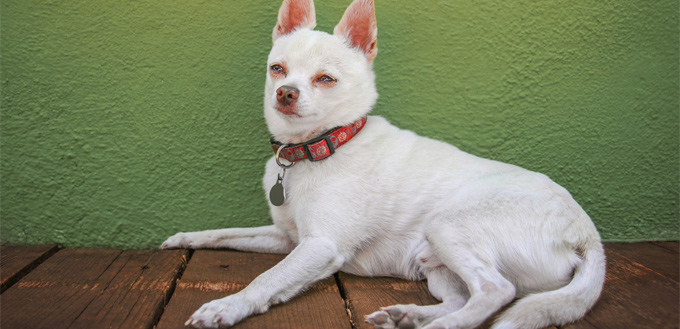Is there anyone that knows a dog better than their owner? As not only the owner but also a friend you probably spend a lot of time with, you probably know all their habits and other behavioral characteristics. That is why you will be the first one to notice when something is out of the ordinary. One of those things may be head pressing, which we are focusing on in this article.
What Is Head Pressing?
Head pressing in an animal condition where they stand face-first near a corner or wall, their head is hanging low, and they are not making any movement. Although the name might suggest otherwise, they do not have to press their head against the wall to exhibit this condition. That happens in some cases, but some dogs will just stand there doing nothing.
The vital thing to take here is that you shouldn’t confuse this behavior with bunting, which involves rubbing their head against the wall, other objects, or even persons. Bunting is a healthy thing that many animals do, but head pressing is an indication of a disease or disorder.

What Are the Symptoms of Head Pressing?
Aside from the state that we described above, other symptoms may follow and let you know that something is not okay. You might notice that your pooch is having issues to identify objects and bumps into them or other visual problems. They may also have trouble with their reflexes and might not appear as jumpy and active as before. It is the behavioral changes that are expected of you to notice, and these may include compulsive pacing in a small area that may lead to sores.
Depending on the core of the problem, your pet might also have an occasional seizure. It is crucial to remember that these will almost never disappear on their own, which is why you need to react instantly.
Related Post: Best Dog Food for Seizures
The Causes of Head Pressing
The problem is that many things can be the reason behind the head pressing act. In some cases, it will be caused by a head trauma that your dog recently had. The severity of this may depend on the strength of the blow, but unfortunately, the list of potential dangers doesn’t end there. Depending on other symptoms that follow, head pressing may also be the cause of prosencephalon (forebrain) disease, a stroke, or even a brain tumor.
Other causes may be hypernatremia, hyponatremia, or another metabolic disorder, toxicity caused by the liver shunt, or the infection of the nervous system, such as fungal and viral infections, parasites, or rabies. Exposure to various toxins, including lead, may also be the reason why your dog exhibits head pressing.
Diagnosing Head Pressing in Dogs
Due to the long list of potential causes, it is critical to take your dog to a vet as soon as possible. If they have been poisoned, it is vital to counter the potential issues in the shortest reasonable timeframe and, if there is a neurological issue, it is crucial to react to avoid it causing permanent damage to your pooch’s health.
Once you take your Fido to the doctor, it is important to share any relevant information about your pet’s medical history. That may include drugs they have been taking, any recent medical problems, or surgical procedures they went through. If you think poisoning might be the possible cause, make sure to mention that along with the reasons why you believe that. You may have recently noticed that the dog vomited or that they had residues from plants on their teeth and you know that there are poisonous plants in the neighborhood.
Either way, the vet will perform an examination to establish whether it was poisoning or your dog is potentially suffering from a disease. If he believes it is the latter one, he will probably order a series of tests, as well as a CT or MRI to confirm their diagnosis and then resort to treatment.
Treatment of Head Pressing in Dogs
Head pressing is only a symptom of an underlying issue, and it will probably go away if that condition is treated. That is why the treatment largely depends on the cause. If your dog was poisoned, the pet doctor will try to figure out the toxin in question and act accordingly to counter it. Your pooch might be given activated charcoal which is known to help in absorbing poisons, and they may also need to receive some fluids to prevent dehydration. Some drugs can ensure your Fido’s organism won’t process the poison and create harmful by-products. The crucial thing, in this case, is to save some time and help the vet identify the toxin by providing him as much info as possible about potential poisons that your dog might have ingested.

If the reason is meningitis or another neurological issue, your dog might need to take antibiotics for some time. It is crucial to ensure that you feed them antibiotics for as long as the vet directed even though they might stop exhibiting head pressing after a couple of days. That is the only way to avoid a relapse and ensure that your dog doesn’t become resistant to that antibiotic in the future.
Finally, if the veterinarian diagnoses a tumor, the therapy might vary in progression, type, and location. In some cases, your pooch will need brain surgery, as well as chemotherapy or radiation therapy. As you might assume, these usually take the longest to recover, and you need to be ready for the possibility that your dog might not fully recoup or recover at all.
Your pet’s recovery will depend on the fact what the underlying condition of head pressing is. There is a good chance that the vet will schedule regular appointments to check your Fido’s health. As for you, you should make sure to make your dog as comfortable as possible. They should be appropriately medicated by the instructions, and you should secure them with enough water and food. It is also advised to avoid vacuuming or making big noises until your pet recovers.
Sources:
- Darlene Stott, Head Pressing in Dogs, Wag Walking
- Head Pressing in Dogs, PetMD
- Head Pressing, Wikipedia






